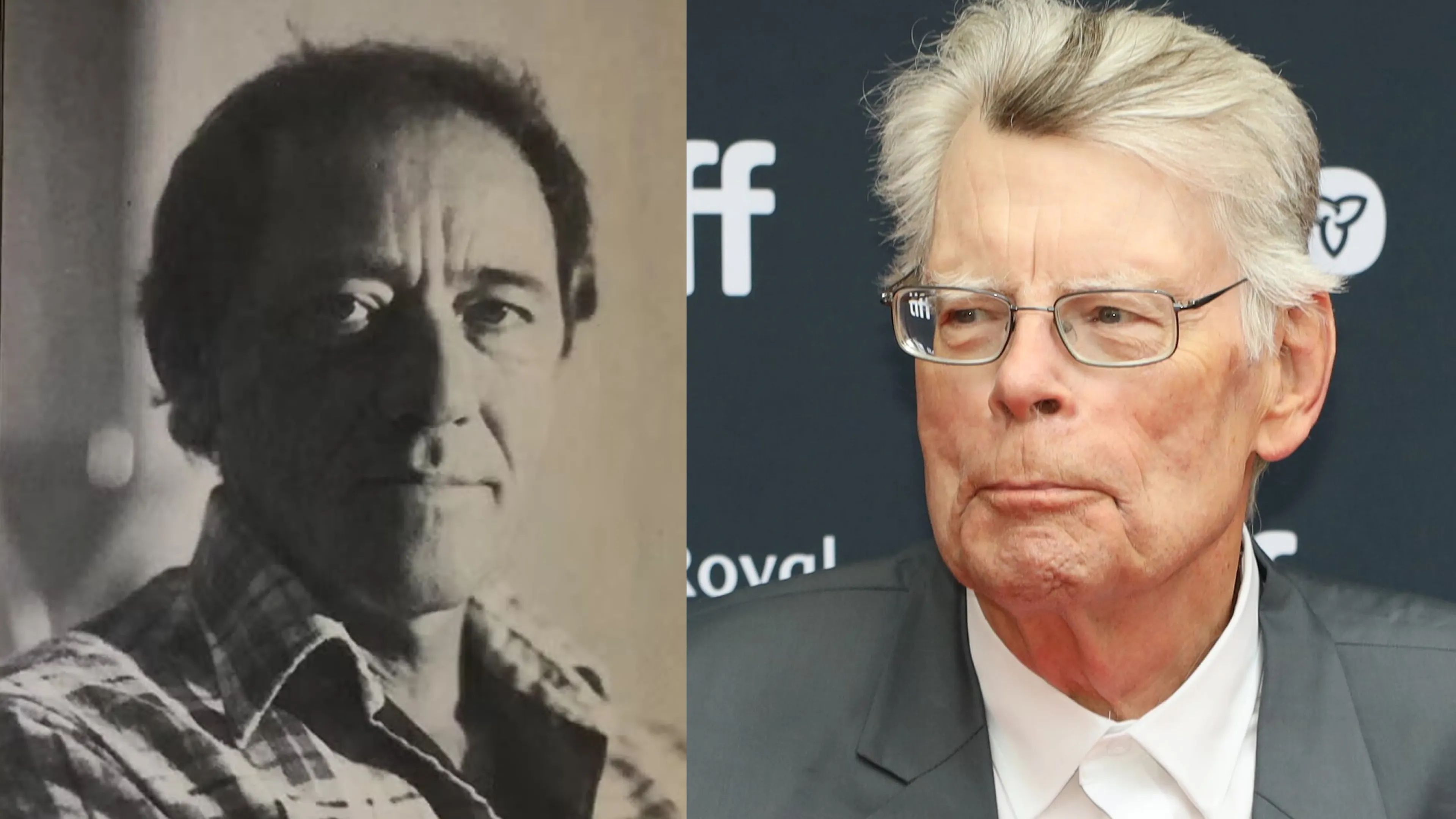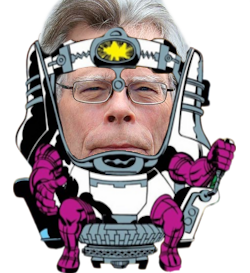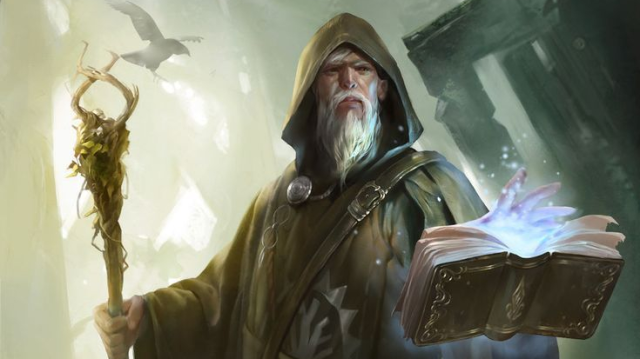Lately, I’ve been thinking about Richard Bachman. He seemingly materialized out of thin air, released four books across a five year run and vanished back to wherever he came from. Maybe you’ve heard of him and maybe you haven’t but, you almost certainly know him by another name: Stephen King.

King is a fascinating figure. Across my many years of English classes, I’ve heard several different flavors of “so and so is the mother/father of American literature.” I don’t know if any of those statements were true but I do know that if you’ve consumed any media from the past 50 or so years, you have a weird uncle and his name is Steve. As sure as birds fly and grass grows, Stephen King writes. The man is seemingly some kind of M.O.D.O.W (Mental Organism Designed Only for Writing) having written so prolifically and for so long that it’s easy to come across his work without realizing it.
 M.O.D.O.W (File Photo)
M.O.D.O.W (File Photo)
Before he was Stephen King™, he was Stephen King: a young writer selling short stories to men’s magazines while trying (and failing) to publish a novel. The legend goes that one day Tabitha, wife, author and MVP of this story, rescued a few pages of a manuscript from the trash. She gave them a read and encouraged a dispirited Stephen to keep working on it. That manuscript about a young girl with psychic powers became Carrie; King’s debut novel.
The book was a modest success at first, but a copy made it into the hands of a scrappy young filmmaker named Brian De Palma. De Palma bought the rights on the cheap, put together a film on a small budget and struck solid gold establishing himself and King while opening the market for college dorm room Scarface posters until the heat death of the universe.
King would follow Carrie with Salem’s Lot, a novel about a vampire coming to a small town in rural America. Sages sing that the idea for the novel materialized when Stephen wondered aloud about what would happen if Dracula were to arrive in modern America. Tabitha came off the top rope suggesting that he’d probably get run over and die which moved Steve to imagine a vampire in rural America. I was going to slot in a joke about how Salem’s Lot probably inspired parts of JoJo’s Bizarre Adventure: Phantom Blood but it turns out that's actually just true. Go then Joestar, there are other worlds than these.

Somehow still not done, King stepped up the plate for round three with the publication of The Shining, rounding out one of the cleanest triples in modern fiction. In just a few years, King had gone from throwing out an early draft of Carrie to publishing three tentpole works of horror fiction whose adaptations would go on to be regarded as some of the best horror films of all time. Well I’ll be. The guy from Maine really did the thing. Stephen King had become Stephen King™.
1977 – the same year that Stephen King published The Shining – was also the same year that he would start publishing under the name Richard Bachman. His reasons for doing so were two-fold. Stephen King is a man who, to this very day, makes other authors feel like they don’t write enough. However, publishers were nervous that Stephen King may be the worst enemy of Stephen King™. Scarcity is king (ba dum tsh) when it comes to sales and “The new book by Stephen King” just doesn’t hit the same when he’s cranking them out like some kind of R.L. Stein for adults. So, his publishers put him in timeout with a strict “one per year” release schedule. However, they didn’t say anything about how many books Richard Bachman could publish.
The other reason is one that I imagine anyone who has ever found success with something can relate to. The meteoric rise of Stephen King™ was just as much of a surprise to the author himself. In the span of a few years, he’d gone from selling short stories to adult magazines to being a capital “A” author. If he had been that good this whole time, why hadn’t success come sooner? If he wasn’t actually that good, how long until people figured it out and the ride came grinding to a halt? Stephen coped with this existential crisis in the traditional way; he made up a guy.
Publishing under the Bachmann name was as much a business decision as it was an exercise to see if he was actually a good writer. Would people buy Stephen King’s writing without Stephen King™’s name? Well, dear reader, we are from the future so we can answer that very easily.
Short answer: no.
Long answer: the Bachmann books were building an audience before a gang of meddling kids and their dog tore off Richard Bachman’s mask and revealed that he was actually Ol’ Shockmeister Steve. However, despite the growing reputation of Bachmann as an author, lightning didn’t strike twice.
In a neat bit of trivia, the first Stephen King book I read was The Dark Half; a novel that asks the question “What if you were haunted by the guy you made up?” Having no knowledge of Richard Bachman or King’s relationship with the persona, the entire thrust of the book went over my head. I mentally filed it away as “ok, I guess” and figured King wasn’t as scary as the VHS cover of It had led my generation to believe. I didn’t read another King book or know any of that context until a friend recommended I listen to a podcast about reading the works of Stephen King in publication order; Just King Things. Back to the point of departure.
Please, take a moment and appreciate the sheer number of things that had to come together for Stephen King to become Stephen King™. Tabitha had to fish a manuscript out of the garbage and like them enough to suggest that her husband keep working on them. What if there was some icky goop on it? What if De Palma thought the book was mid? What if Sissy Spacek hadn’t acted her ass off in that movie? Not only would we not get Stephen King™ but De Palma might not have gone on to direct the first installment of a franchise featuring some of the best train-centric action scenes to ever grace the silver screen.
 Only slightly less cool than actually riding a train
Only slightly less cool than actually riding a train
That’s what makes this story so captivating to me. I look at someone like Stephen King and the man might as well be a wizard. To me, he is someone who has “made it.” He’s made it in a way that most people can’t even dream of. Despite his apparent power to bend reality and the publishing industry to his will, he is still human and has grappled with the dilemma of luck and skill about as publicly as a person can. He got caught publishing under a pseudonym, opened up about how he worried that his success was a fluke and found out the hard way that not even he could make lightning strike twice. As you know, I am not a wizard. However, I do know a thing or two about getting struck by lighting (metaphorical).
Odds are good that if you’re reading this you’re familiar with Hbomberguy and his video on plagiarism on youtube. If you haven’t, go check it out. It’s a certified banger™. If you have seen it, you know that I, or rather the pseudonym I make stuff under, was mentioned at the end of that video as an example of creators on the platform that are doing things right aka creating and not plagiarizing. I was as surprised as anyone. The night it went up, I saw that there was a new hbomberguy video, went to bed and woke up to what must have been over a hundred messages; a number that only grew as other people with 10 pm bedtimes started waking up.
I’ve never talked to hbomberguy (if you’re reading this. Hi! I find you very intimidating and hope you’re well) so I don’t know what process led to my name ending up there. From what I gather, my video on the appeal of body horror to queer audiences just happened to jump through whatever hoop google was holding when someone working on the team was searching for creators that played in the intersection of queerness and horror. That person happened to like it enough to feature it in what happened to become one of the biggest videos to hit youtube that year. Last I checked, around 27 million people have watched one of my favorite people on the platform give me the nod.

Back before I started uploading things to theinternetdotcom, I thought that having a few hundred subscribers felt like a lot. I try to avoid metrics, but the last time I was forced to gaze into the void, my youtube channel had somewhere around 50k subscribers. To put things in perspective, that is nearly five times the capacity of the largest stadium in North America; Rickicon 2026 is gonna go wild. I’ve even been told by some friends and acquaintances new and old that they now find it intimidating to reach out to me. Those messages come almost exclusively after embarrassingly spilling water on myself (I’m working on my drinking problem). By some, maybe even many, accounts, I am a capital “S” success as much as anyone can be while making videos about gay anime.
I don’t recall what I used to imagine what success would feel like, but I certainly thought it would feel different than this.
On the whole, people are not very good at numbers. Our brains are systematically bad at comprehending base rate information and after a certain point large numbers are flattened out into a uniform “IT BIG.” How we emotionally process numbers is very different from how we cognitively process them. This is how I can type out that my subscriber base could fill the largest stadium in North America five times over and still feel like maybe it’s all a fluke.
I remember being over the moon the first time something I made passed a thousand views. Now, I would probably cry if I put something out and it didn’t pass at least ten thousand views. It’s normal for a person to want other people to see the things they share. It’s also normal for a person to want something they can point to as proof that they’re good enough. Unfortunately, especially in the age of the internet, it can be almost impossible to find it. Hitting metric thresholds on these platforms just unlocks more metrics and there will always be another milestone to pass. Trying to find stability on these platforms isn’t like walking a path, it’s running on a treadmill. What you thought was the ceiling becomes the new floor as your expectations rise higher and higher like some kind of tower that assuredly bears no resemblance to anything in the bible.

What horrors wrought the hubris of man
There are also all kinds of factors that are totally beyond your control and even more that are outside of your awareness. There is a whole cottage industry built up around selling people the latest fool-proof method for finding success on these platforms. Even the ones that aren’t flat grifts are still just things that worked for one person at one time. The method they use for making thumbnails plays well with their audience but who knows if it’ll work well for yours. In truth, the product they’re actually selling isn’t advice. They’re selling the perception of control; the idea that success is a predictable outcome based on a set of rational factors.
Nevermind how much the actual platforms themselves shift things around. You could ask your dog for advice and you’d probably have just as good of an idea of what is being pushed in the blackbox algorithm that day as anyone else. Heck, you might have a better idea since dogs are just good at these kind of things. In the week I’m writing this, Google's new AI restriction feature has hidden every video I’ve made in the past two years. I had initially wanted to make this post as a video but sinking the time into recording and editing seems wasteful until that whole mess gets sorted since the topics I want to cover, gay anime, would almost certainly get flagged.
So keeping with the treadmill metaphor. Sometimes it feels more like trying to hit a moving target while running on a treadmill and a google employee is being paid in the mid six-figures to flicker the lights. I don’t know how they got the job either but if you find out, please let me know. You can even toss in another mid six-figure engineer slamming all the buttons on the treadmill at random if that sounds too easy for you. Some people are still going to make that shot. Some are even going to make it multiple times. Does being skilled help? Almost certainly yes. Is it possible to be so skilled that you would always make it? Almost certainly not.

After a certain point, it’s not possible to be that good. I’m also not entirely sure where the sweet spot between luck and skill is so I googled it and found out it’s ten percent luck, twenty percent skill, fifteen percent concentrated power of will, five percent pleasure, fifty percent pain and a hundred percent reason to remember the name. I’m pretty sure luck is a bigger part of it than that. However, accepting that there is always a near timeline where you’re the same person but things just didn’t come together is uncomfortable to think about.
There is an excellent episode of the Slate series Decoder Ring that digs into these ideas. It focuses on the career of an artist who doesn’t make it despite being good enough. She spends her career watching her peers go on to become famous artists while the same doors that opened for them stay locked for her. Willa Paskin notes in the closing of the episode how often Van Gogh was brought up during her research for the episode. Comparing someone to Van Gogh is meant as a compliment, but people forget that Van Goah never got to benefit from his now famous work. Van Gogh never got to be Van Gogh™. Bringing him up is something of a consolation prize. It’s a way of avoiding the uncomfortable reality while reassuring yourself that everything works itself out in the end if the person is really good enough.
It’s a hard episode to listen to but one that I strongly recommend giving it a listen to. Not to spoil too much but I found it, quite frankly, inspiring hearing the subject, Ilona Granet, talk about both her resilience to and her acceptance of her own lack of control, which is something I’ve long struggled with. In particular, this passage from the back half of the episode has stayed with me
“…Artist don’t get to decide if their work is valuable, if it’s meaningful, if it moves people, all they get to do is make it in the face of so many material and psychological constraints and hardships. Most of us do everything we can to get whatever scrap of control we can manage…She sat with her lack of control for decades, and that’s been painful and disappointing. But that’s not all it’s been as hard as it is to make it as rare, it seems to me, just as hard, just as rare to keep trying so single mindedly when you don’t.”
- Willa Paskin, 2021
I don’t know what kind of conclusions Stephen King has come to about himself and his work. Based on his acceptance speech for his 2003 lifetime achievement award from the National Book Foundation, I do know that his wife thinks so and she’s seemingly been right about everything else so far. However, my own beautiful wife’s thinking I’m good enough hasn't put my own suspicions to rest. Although they do tend to sleep through the night lately.
Even the people who like King’s work seem willing to acknowledge that not everything he does is great. When you take as many swings as he does, you’re bound to write at least one or two stories that work like Goosebumps books without the fun of Goosebumps books. My personal pick is the one about a set of mechanical chattering teeth eating a guy. Even King himself seems willing to acknowledge when he whiffs like during his short career as a director (although I will contend that Maximum Overdrive is a brilliant piece of Americana preserved in amber like a mosquito).
 Experts hard at work on Mr. Robert Zombie's Maxium Overdrive remake
Experts hard at work on Mr. Robert Zombie's Maxium Overdrive remake
However, I can only admire someone who is willing to follow through on those swings. I’d venture that he’s also aware that some of those stories aren’t the best but continued polishing them anyway and setting them out into the world. No one sets out to make bad art and no one is more aware of the faults of their work than the artist.
I’ve talked myself out of ideas wholesale. I very nearly talked myself out of writing this post at all. I also can’t seem to finish a project without thinking that the whole thing has been a waste of time. When the bad brain creeps up and you start to wonder if you just don’t have the sauce, dropping the project can feel like the only way to control where it goes. Through all the doubts he’s shared and those he’s kept hidden Stephen King has never stopped swinging. You can control how you and your work are received just as well as you can control lighting but you can always control whether you’re going to try.
Unless you are a wizard and can control lighting. In which case, what are you still doing here? Go do some wizardshit.

Until my next entry. Be nice to yourself.